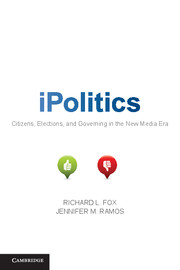Book contents
- Frontmatter
- Contents
- List of Tables and Figures
- Contributors
- Preface and Acknowledgments
- Introduction
- Section I The Shifting Media Universe and News Consumers
- Section II Campaigns and Elections in the New Media Environment
- Section III Civic Mobilization and Governance in the New Information Age
- 7 Preaching to the Choir or Converting the Flock
- 8 Twitter and Facebook
- 9 The Dog That Didn't Bark
- 10 New Media and Political Change
- Index
- References
7 - Preaching to the Choir or Converting the Flock
Presidential Communication Strategies in the Age of Three Medias
from Section III - Civic Mobilization and Governance in the New Information Age
Published online by Cambridge University Press: 05 June 2012
- Frontmatter
- Contents
- List of Tables and Figures
- Contributors
- Preface and Acknowledgments
- Introduction
- Section I The Shifting Media Universe and News Consumers
- Section II Campaigns and Elections in the New Media Environment
- Section III Civic Mobilization and Governance in the New Information Age
- 7 Preaching to the Choir or Converting the Flock
- 8 Twitter and Facebook
- 9 The Dog That Didn't Bark
- 10 New Media and Political Change
- Index
- References
Summary
On September 9, 2009, President Barack Obama delivered a prime-time television address on health care reform to a joint session of Congress. According to nielsenwire.com, more than 32 million Americans watched the president's appeal on TV. Less than two weeks later, on September 21, 2009, Obama took to the stage of the Late Show With David Letterman, only the second time a sitting U.S. president had appeared on a network late-night comedy show. This appearance – Obama's fifth on the Letterman show – capped an intensive media push by the president to promote health care reform, a push that included interviews on five Sunday news shows the previous day, spanning ABC, NBC, CBS, CNN, and the Spanish-language network Univision. That same month, Obama's Internet team sent weekly e-mails on health care (followed by two per week in October) to the roughly 13 million individuals in its famed e-mail database.
Obama's media frenzy was notable not only for the sheer number of public appeals but also for the diversity of outlets to which he carried his message. In addition, Obama's messages had quite different tenors, depending on the outlet audience to whom he was communicating. In his nationally televised address to the nation, the president was, to borrow a phrase, a unifier, not a divider, offering a solemn appeal for national unity. He thus observed, “In 1965, when some argued that Medicare represented a government takeover of health care, members of Congress – Democrats and Republicans – did not back down. They joined together so that all of us could enter our golden years with some basic peace of mind.…I still believe we can replace acrimony with civility.”
- Type
- Chapter
- Information
- iPoliticsCitizens, Elections, and Governing in the New Media Era, pp. 183 - 205Publisher: Cambridge University PressPrint publication year: 2011
References
- 2
- Cited by

